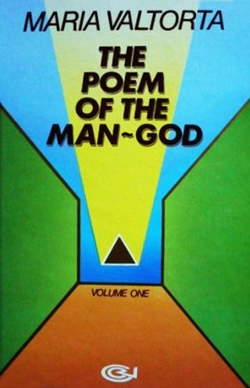The Poem of the Man-God
Maria Valtorta, Italy
|
The Poem of the Man-God, often promoted as the “bible” of the modern visionary movement, is a five-volume life of Christ written in the 1940s by Maria Valtorta, an invalid Italian woman born in 1897 in Caserta. Her notebooks comprise almost fifteen thousand pages and, according to the author, were dictated by entities that called themselves Jesus and Mary. The work contains serious theological errors and heresies.
Valtorta’s life of Jesus was first called “The Gospel of Our Lord Jesus Christ as it was revealed to Little John,” later shortened to “The Poem of Jesus,” perhaps to hide the fact that it was, in reality, a new gospel. The title was then revised to “The Poem of the Man-God,” which accurately portrays Jesus in the light of New Age doctrine, that each person is capable of achieving Christ consciousness.
Contrary to the Book of Genesis, in which original sin was an act of disobedience that endowed Adam and Eve with the knowledge of evil, Valtorta’s Jesus declares that original sin was the sexual union of Adam and Eve, who would have been demigods capable of generating children from the light had they not imitated the animals. In their fallen nature, the descendents of Adam and Eve have now become lower than beasts, despised by God. By changing the nature of original sin from acquiring the knowledge of evil to human procreation, The Poem of the Man-God rejects the idea that acquiring occult knowledge through gnosis is a form of idolatry.
Unlike the Evangelist’s powerful declaration from John 1:1 that says, “In the beginning was the Word, and the Word was with God, and the Word was God,” The Poem of the Man-God declares that in the beginning Mary was with God and that she was Wisdom who became Word, a dangerous theological error. Mary is no longer the obedient handmaiden of God who was united with her Son in one single act of redemption on the cross, but equal to God and superior to her son, replacing him in a separate and greater act of redemption through messages given privately to individuals.
Another heresy is the revelation that Jesus Christ does not forgive sin, the tenet of faith that is central to Christianity and essential for salvation. Other passages from The Poem of the Man-God mock Christ and the Gospel message. At the Last Supper, for example, Thaddeus has an outburst of rage and knocks Judas down with a mighty backhanded blow, threatening to strangle him. Jesus comes in unexpectedly and asks Peter if he has a toothache. They start pouring and passing the wine, with Jesus singing, “I had faith, that is why I spoke. But I was deeply humiliated. And in my dismay I said, every man is untruthful.” After the Crucifixion, Mary does not wish to wrap Jesus in burial shrouds as required by Jewish law, chastises all men as wolves and snakes, and states that she is “hanging from a thread over an abyss.”
According to Father Mitch Pacwa, four years after Valtorta began to receive her “dictations” in 1947, she handed over 10,000 handwritten pages to her spiritual director, Father Romuald Migliorini, O.S.M. Another priest, Father Corrado Berti, O.S.M., brought the manuscript to Monsignor Augustin Bea, S.J., spiritual director to Pope Pius XII. According to the books’ promoters, Monsignor Bea said in 1952, “As far as exegesis is concerned, I did not find any errors in the parts which I examined,” clearly indicating that he did not read the work in its entirety. On February 26 of the following year, Fathers Migliorini and Berti had a private audience with Pope Pius XII. Later, as he stood in Saint Peter’s Square, Father Berti wrote down Pope Pius’ words as he remembered them: “Publish this work as it is. There is no need to give an opinion about its origin, whether it be extraordinary or not. Whoever reads it, will understand. One hears of many visions and revelations. I will not say they are all authentic, but there are some of which it could be said that they are.”
The books’ promoters called Pope Pius XII’s words a “Supreme Pontifical Imprimatur,” in spite of the fact that an imprimatur is never oral and the Holy Father did not examine the books. Father Berti then brought the books to the Vatican press, expecting publication. In 1949, however, two commissioners from the Holy Office, Msgr. Giovanni Pepe and Father Berruti, O.P., condemned the work and ordered Father Berti to sign an agreement not to publish it. Instead of handing over every copy as requested, Father Berti returned the original manuscripts to Valtorta. In 1952, in violation of his signed agreement, Father Berti went to publisher Emiliano Pisani who, although fully aware of the Holy Office’s opposition, printed the first volume in 1956, which was followed by a new volume each year through 1959.
After the fourth volume appeared, the Holy Office examined The Poem of the Man-God and condemned it, recommending that it be placed on the Index of Forbidden Books on December 16, 1959. Pope John XXIII signed the decree. The condemnation was published in L’Osservatore Romano on January 6, 1969, along with an article entitled “A Badly Fictionalized Life of Jesus.” The books’ condemnation did not stop publication, however. A second edition of ten volumes was printed and likewise condemned on December 1, 1961. The books were later translated into German, French, Spanish and English. The Poem of the Man-God is now published in twelve languages and is being promoted at unapproved apparition sites all over the world as a work that was approved by the Blessed Mother.
For more information please visit The Poem of the Man-God - Maria Valtorta.

